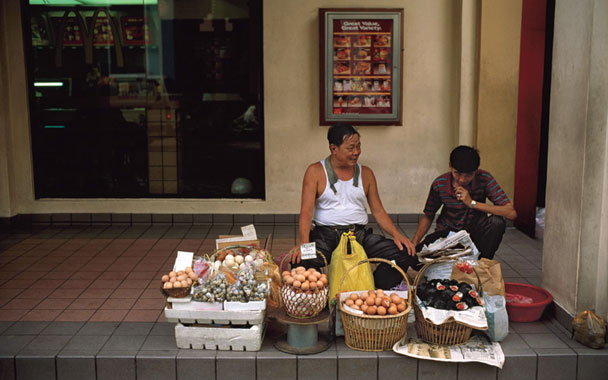About 200 miles from the equator, where the average high hovers around 90 degrees and buttercream rosettes wouldn’t seem to stand a snowball’s chance in hell, Kuala Lumpur boasts an eccentric number of cake-baking and cake-decorating schools and classes. (“Maybe it’s because we were a British colony,” explained a Malaysian friend when I mentioned this to her. “The idea of baking a cake and decorating it just seems very exotic and interesting to us.”) Nevertheless, visitors for whom Malaysian cooking holds more interest than Sachertorten or bûches de Noël can find classes offering a good introduction to the local cuisine. Two in particular are informal and intimate and give students access to a Malaysia they might not otherwise discover.
Petaling Jaya, a leafy suburb described by K.L. natives as the capital’s most typical, is where Ana Abdullah’s LaZat Malaysian Home Cooking Classes meet several days each week. On the morning I attended her program, she and her soft-spoken assistant, Saadiah, led me and a science writer from Australia through the preparation of prawn fritters, beef rendang, spicy cucumber salad, and tiny traditional cakes flavored with pandan leaf. Saadiah and Ana paid scrupulous attention to teaching us how to grind and fry curry paste and how to plate food Malaysian-style. Afterward, we ate our efforts on Ana’s broad, shady patio while sipping herbal teas and dreamily discussing world events, which at that moment seemed very far away. (011-60-19-238-1198; malaysia-klcookingclass.com; $52 for four hours, including lunch)
Across town, somewhat closer to world events and to a certain kind of Malaysian fabulousness, you can take cooking classes with celebrity chef Ismail Ahmad, whom Malaysians know through his many TV appearances and because of Rebung, the restaurant he co-owns with Dr. Sheikh Muszaphar Shukor, Malaysia’s first astronaut and the world’s first Muslim to observe Ramadan in outer space. A burly chatterbox, Ismail himself ventured closer to the stars while working at the Watermill Center, in Watermill, New York, where, he says, Julia Roberts and Madonna enjoyed his cooking. Rebung, however, is almost unknown to tourists; it’s where the city’s politicians and businesspeople go when they long for the down-home dishes their mothers and grandmothers made. The morning I met Ismail, he led me through a market not far from the restaurant, introducing me to butchers and fishmongers, pointing out the differences between various kinds of Malaysian shrimp pastes and teaching me how to select only the freshest edible ferns. Back at Rebung, he turned me loose in his large, slippery-floored kitchen, where his cooks showed me how to efficiently peel fresh turmeric and revealed the chef’s very clever “secret technique” for preparing curry paste. But my day’s lesson was cut short. A member of Dr. Shukor’s family was badly injured in a freak accident. While Ismail fielded anxious phone calls from journalists and friends, I joined his customers for the daily lunch buffet. I ate spectacular tripe stewed with fresh turmeric, as well as young jackfruit with the taste and texture of artichoke. A dish of tapioca leaf cooked with fermented durian also amazed me. The fermentation, Ismail told me, preserved the fruit’s sweet floral taste while removing its infamous funk. Worried that I felt neglected, he plucked a seven-month-old baby from a family sitting near me and placed him in my arms. The child and his family seemed delighted to have a pudgy, bearded foreigner dandle him and carry him around. I was supremely happy, too. The home-style Malaysian food and the jolly home-style Malaysian baby made for the sort of experience you don’t come by easily at latitudes where cooking classes are dominated by exacting recipes and rigorous demonstrations of technique. (011-60-3-228-32119; rebung.com.my; $47 for four hours, including an all-you-can-eat buffet lunch)
What I Learned
Even Malaysians think grilling or toasting shrimp paste is smelly, but it must be done; otherwise, the dish will taste glaringly inauthentic.
Biggest Surprise
The size and shape of ingredients—in a spicy cucumber salad, for instance—have a big impact not only on mouthfeel but on the way the individual flavors of the dish are balanced.
Before You Go
Malaysians are particularly kind to visitors who dress modestly. When packing, keep Islamic sensibilities in mind.
Where to Stay
Traders Hotel (011-60-3-233-29888; shangri-la.com; from $116) has K.L.’s most astounding views of the 88-story Petronas Towers.



 Pinterest
Pinterest






